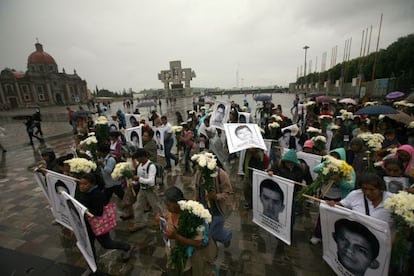Mexican Prosecutor admits mistakes were made in exhuming Iguala graves
The parents of the 43 missing students say they do not trust the official investigation


The Mexican Prosecutor General’s Office has told the families of the 43 student teachers who disappeared in Iguala that mistakes were made when exhuming a number of mass graves found there three weeks ago. In a meeting with the students’ parents on Monday, Interior Minister Miguel Ángel Osorio Chong and Prosecutor General Jesús Murillo Karam blamed the errors on Guerrero’s state attorney’s office, which was initially in charge of the case.
“They told us – and we have confirmed this with other experts – that there was an error in the exhumation carried out by the Guerrero Attorney General’s Office and all the other organizations at the state level,” Vidulfo Rosales, a member of human rights organization Centro de Derechos Humanos Tlachinollan, told the press as he left the meeting. “They made a mistake in the identification process.”
Almost a month after the students disappeared, around 60 of the students’ family members traveled from Ayotzinapa to Acapulco by bus to listen to details of the investigation. Although Murillo Karam ruled out that the 28 bodies found in five graves in Iguala belonged to the students, the prosecutor has told relatives that no final conclusion can be drawn before forensic tests are completed.
“They told us they are questioning some detainees and that they are getting them closer to the kids, but nothing else,” says Felipe de la Cruz, a member of the Escuela Normal Rural de Ayotzinapa teachers’ college. “We do not have faith in the investigation because we are not seeing results.” The families say they will continue their own independent search.
Iguala municipal police arrested and allegedly handed the students over to some hitmen from the Guerreros Unidos drugs cartel on the night of September 26. On Monday, Mexico’s main newspapers carried a double-page announcement featuring the photos of the 23 missing students. The Prosecutor General’s Office is offering a $110,000 reward for information that helps authorities find the students or those responsible for their disappearance.
Among those demanding a swift solution to the case is Father Alejandro Solalinde, who works helping Central American migrants crossing Mexico. He showed up at the Prosecutor General’s Office to present the testimony of four people who spoke to him and told him that they knew where the 43 students were. The priest told the press waiting in front of the building that the students were killed on the outskirts of Iguala in a place where they were taken by municipal police, who burned their bodies using wood and diesel.
The Prosecutor General’s Office is offering a $110,000 reward for information that helps find the students
The priest says one of the witnesses showed him on a map where the bodies might be – a site in northern Guerrero not far from where the students were arrested. Until now, the authorities have not accepted Solalinde’s testimony but they have scheduled a meeting for the priest and the Prosecutor General in the next few days. “This government is trying to limit political damages more than it is trying to find a solution or justice,” the priest said.
Meanwhile, Mexican President Enrique Peña Nieto keeps repeating his promise to solve the case and find the students. This weekend, federal forces took over security in 14 municipalities in Guerrero and one in Mexico State. Peña Nieto has acknowledged that “there is evidence of infiltration by organized crime” in 15 towns. “We will keep working so that, together with local governments, we can establish order and keep organized crime from infiltrating our institutions, especially those in charge of security.”
Translation: Dyane Jean François
Tu suscripción se está usando en otro dispositivo
¿Quieres añadir otro usuario a tu suscripción?
Si continúas leyendo en este dispositivo, no se podrá leer en el otro.
FlechaTu suscripción se está usando en otro dispositivo y solo puedes acceder a EL PAÍS desde un dispositivo a la vez.
Si quieres compartir tu cuenta, cambia tu suscripción a la modalidad Premium, así podrás añadir otro usuario. Cada uno accederá con su propia cuenta de email, lo que os permitirá personalizar vuestra experiencia en EL PAÍS.
En el caso de no saber quién está usando tu cuenta, te recomendamos cambiar tu contraseña aquí.
Si decides continuar compartiendo tu cuenta, este mensaje se mostrará en tu dispositivo y en el de la otra persona que está usando tu cuenta de forma indefinida, afectando a tu experiencia de lectura. Puedes consultar aquí los términos y condiciones de la suscripción digital.








































